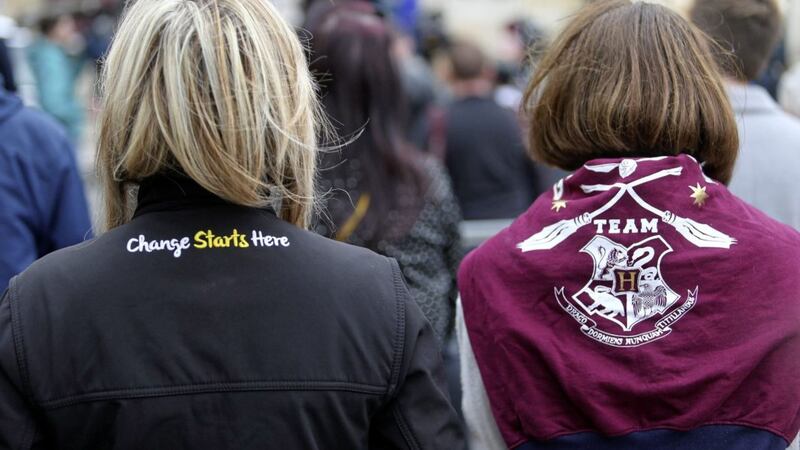THERE is nothing about the murder of Lyra McKee that Northern Ireland has not witnessed before, including the remarkable scenes of public courage, political unity and challenge from the pulpit.
Many noting this have wearily asked if anything will change. But sometimes these moments do bring change.
Revulsion at the murder of the three Quinn children in Ballymoney in 1998 turned the unionist population away from the Orange Order.
That same year, the loyalist murders of Philip Allen and Damien Trainor in Poyntzpass, and the subsequent visit of David Trimble and Seamus Mallon, helped the passing of the Good Friday Agreement one month later.
Robert McCartney's murder in 2005 led directly to IRA disbandment and the St Andrews Agreement.
In 2009, Martin McGuinness's defiance of the dissident murderers of soldiers and a police officer was a watershed for republicanism and paved the way for the final devolution of policing and justice.
The change many are looking for now is restoration of Stormont. Although dissidents oppose devolution, its absence is being linked to a general drift that can only fuel instability.
A narrative has been developed that Sinn Féin's base has given up on Stormont but even before McKee's death, the party was apparently hearing otherwise on the doorsteps.
Most people still want devolution restored and McKee's death has crystallised that in the public mind.
**
Discussing the prospect of fresh Stormont talks, Arlene Foster said: "It can't be a five-nil situation."
This echoes a statement in 2017 by DUP former minister Simon Hamilton, who said Sinn Féin could not demand a "10-nil win". Hamilton was on the team that reached the draft deal in February 2018.
The problem for both parties has always been finding something the DUP wants to match what Sinn Féin wants, in order to present a 'balanced' outcome.
Foster has persevered with legislation on Ulster-Scots, despite most unionists finding it ridiculous.
Perversely, the solution to the Stormont deadlock is not fewer demands but more.
**
A DUP council candidate in Belfast has denied being a UDA supporter despite being photographed at an event glorifying the UDA, surrounded by UDA banners and wearing a UDA T-shirt.
"I admit it looks bad," David McKee, a former member of the UDA-linked Ulster Political Research Group, told the Sunday Life.
He later issued a statement through the DUP press office renouncing paramilitarism and saying "democracy is how to effect change in society".
It is a reminder that in the last council election in 2014, the DUP and UDA denied forming a pact after UDA ex-prisoners ran as DUP candidates and UDA members were reportedly ordered to vote DUP.
But like it or not, this is how the peace process is supposed to work. Failure to bring the UVF into politics has left it frozen in pure criminality, as former PUP leader Dawn Purvis noted this week.
The question is whether political inclusion works when you will not admit you are doing it.
**
Ian Paisley Jr has been a thorn in the DUP leadership's side for years, all the more so since Arlene Foster took over.
His surname and local power base have made him impervious to discipline and from his increasing brazenness he clearly knows it.
Former health minister Jim Wells has similarly slipped the leash. Since being dropped from the executive four years ago he has become an outspoken media fixture with no fear of sanction.
Yet all it has taken to leave both men confounded is to run a gay council candidate, Alison Bennington, in Glengormley.
This has driven Wells to bizarre ramblings on Radio Ulster, while Paisley said "away and get another story" and slammed the phone down on this newspaper.
It seems being gay in the DUP conveys a kind of superpower - one the leadership intends to use.
Bennington was seated in the front row for the party's manifesto launch, beside Foster and deputy leader Nigel Dodds.
**
Aontú is campaigning in the council elections against abortion and for joint authority, although neither are within the gift of local government.
This has already caused Sinn Féin to omit all mention of abortion in campaigning.
Now it has raised joint authority, within days of Aontú doing the same. Sinn Féin president Mary Lou McDonald told an Easter commemoration at Milltown Cemetery that if Stormont cannot be restored "the alternative is not direct rule but a new British-Irish partnership - a joint authority - to implement the agreements and safeguard rights".
Sinn Féin must know this claim can only come back to haunt it but that apparently matters less than losing a few first preferences next week.
**
Secretary of state Karen Bradley has been spotted twice in Northern Ireland over the past week and spoke in the Commons on Tuesday about restarting Stormont talks.
However, her dwindling authority suffered another setback the next day as the prime minister performed a mini-reshuffle to prop up her collapsing cabinet.
Bradley's long-time parliamentary private secretary, Matt Warman MP, was promoted to assistant government whip.
The New Statesmen reports that Warman was Bradley's most trusted adviser at the Northern Ireland Office and was highly regarded, including by the DUP's Westminster team.
"Karen Bradley's job just got even harder," the magazine concluded.
newton@irishnews.com









